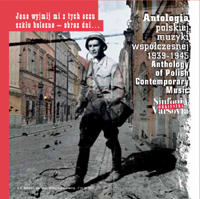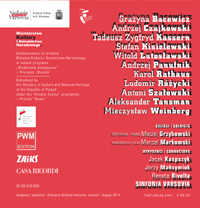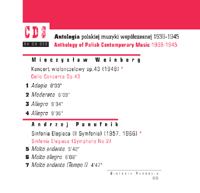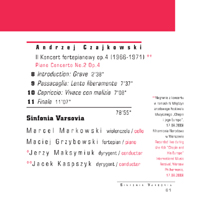|

Click
Here for a portion of the Study in Contrast radio program
discussing the piano concerto with David Owen Norris, Radu Lupu, and
John Schofield.
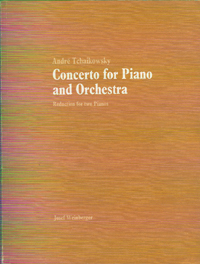
Reduction for Two Pianos
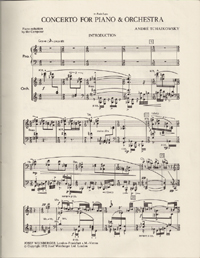
Introduction
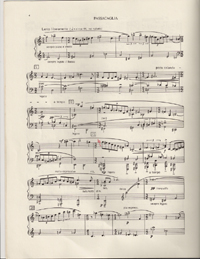
Passacaglia
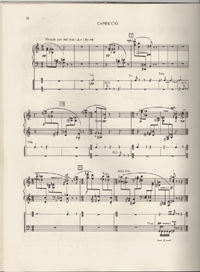
Capriccio
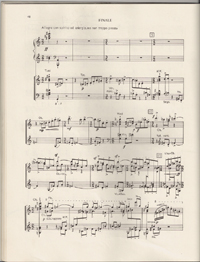
Finale
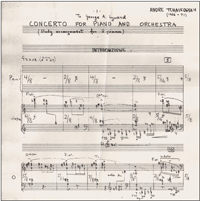
1st Page Original Manuscript
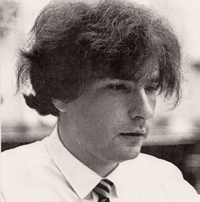
Radu Lupu (1972)
(1st performance)
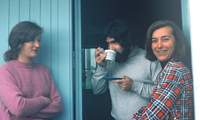
Radu Lupu
(1975) with Elizabeth Wilson (L) and Judy Arnold (R)
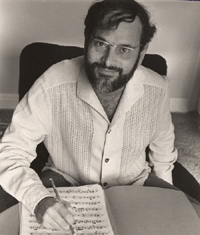
André making corrections (1975)
(2nd, 3rd, 4th Performances)
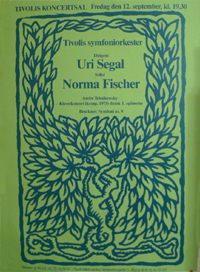
Copenhagen
Concert Poster
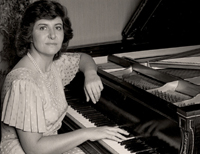
Norma Fisher (1986)
(5th Performance)
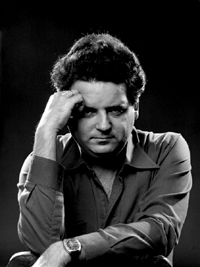
Uri Segal (Conductor)
Copenhagen, Denmark
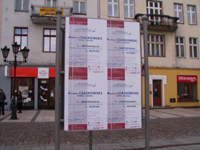
Kalisz Concert
Poster
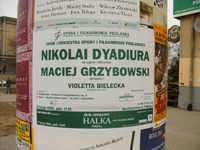
Bialystok Concert Poster
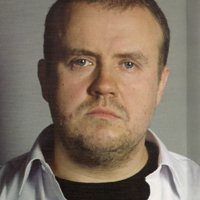
Maciej Grzybowski (2008, 2013)
(6th, 7th, 8th, 9th, 10th
Performances)
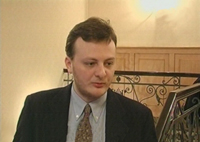
Adam Klocek
(Conductor)
Kalisz, Poland
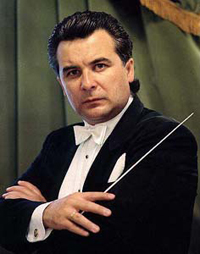
Nikolai
Dyadiura (Conductor)
Bialystok, Poland
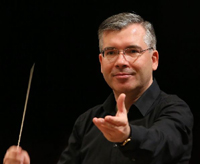
Piotr
Wajrak (Conductor)
Lublin, Poland
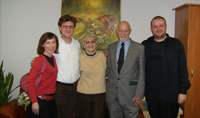
(right to
left) Maciej Grzybowski, Dave Ferré, Halinka Janowska, Aleksander
Laskowski, and Joanna Fidos.
Bialystok, Poland

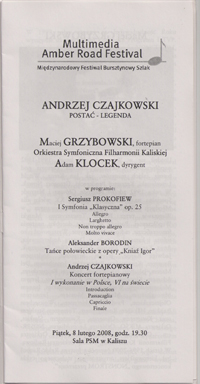
Kalisz,
Poland, Program
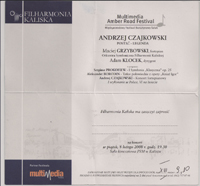
Kalisz,
Poland, Ticket
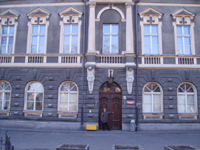
Kalisz,
Poland, Concert Hall
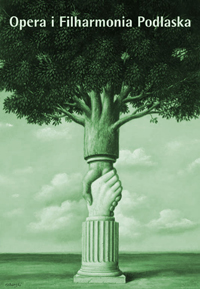
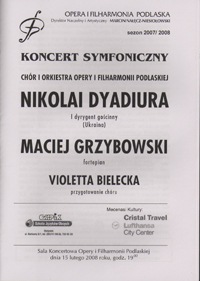
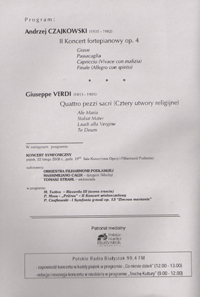
Bialystok,
Poland, Program
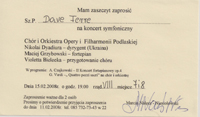
Bialystok,
Poland, Ticket
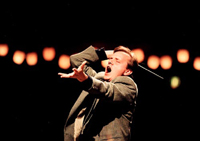
Marcin Nalecz-Niesiolowski
Artistic Director
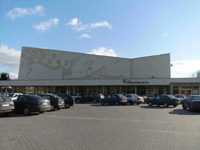
Bialystok,
Poland, Concert Hall
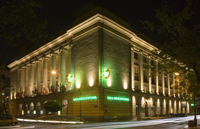
Warsaw Philharmonic
Hall
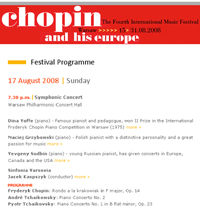
August 17,
2008 Program
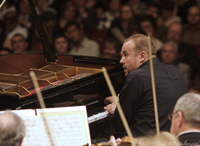
Maciej Grzybowski
- Pianist
August 17, 2008 Concert
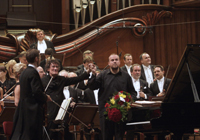
Maciej Grzybowski
- Pianist
August 17, 2008 Concert
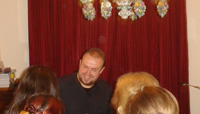
Maciej Grzybowski
- Pianist
August 17, 2008 Concert
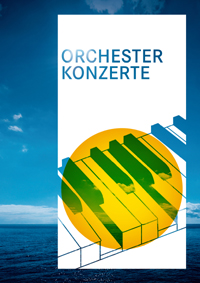
Poster Artwork for July 22, 2013 Performance
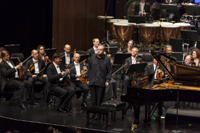
Maciej Grzybowski - Pianist
July 22, 2013 Concert
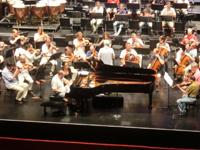
Maciej Grzybowski - Pianist (rehearsal)
July 22, 2013 Concert
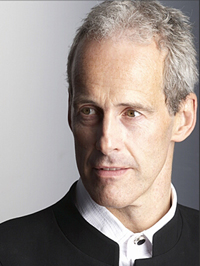
Paul Daniel -
Conductor
July 22, 2013 Concert
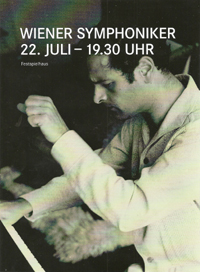
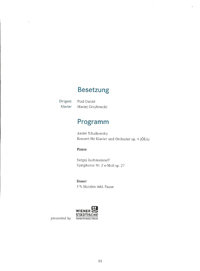
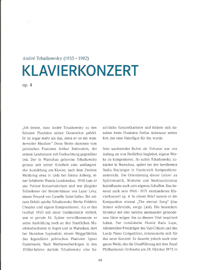
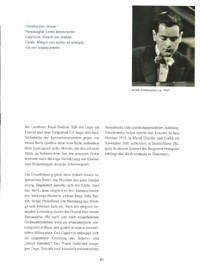
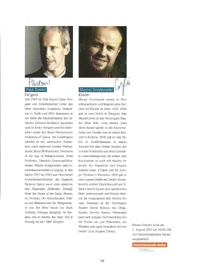
Program Pages from July 22, 2013 Concert
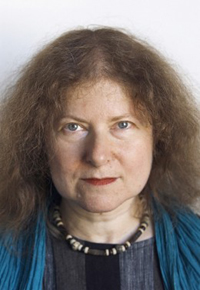
Dorota Szwarcman
Music Critic for Polityka
(Polish newsmagazine)
|
Piano
Concerto (1966-1971) - Opus 4
This
webpage provides information about the André Tchaikowsky Piano
Concerto - Opus 4. First are music links and then text that lists all
known details regarding this composition, including performances to
date, plus text about the concerto from the book, The Other Tchaikowsky
- A Biographical Sketch of André Tchaikowsky.
(2017)
Piano Concerto, Opus 4 / Lublin Philharmonic
As part of their regular concert season, the Lublin (Poland) Philharmonic
included the Andrzej Czajkowski Piano Concerto Opus 4, which was performed
on September 29, 2017 with performers Maciej
Grzybowski, piano, and Piotr
Wajrak, conductor. This performance was recorded and appears on
YouTube
and Vimeo.
There is also an audio-only recording (see below).
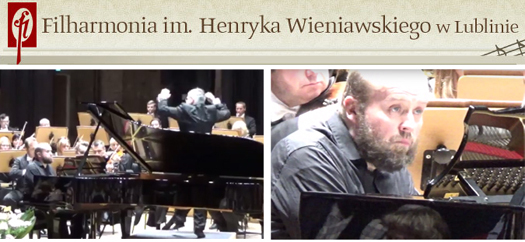
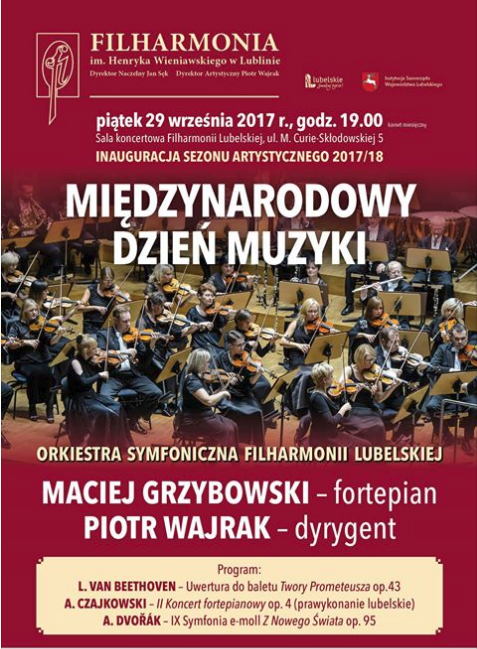
Study
in Contrast (Audio Program)
From a radio program, a Study in Contrast, hear pianists
David Owen Norris and Radu Lupu, plus John Schofield of Josef Weinberger
Music Publishers, discuss the André Tchaikowsky Piano Concerto
Opus 4. Use the following mp3 link: study_in_contrasts_opus_4.mp3
or the player below.
For the
entire Study in Contrast program, see the Miscellaneous
button.
Second
CD Recording of Opus 4 (2014)
Sinfonia Varsovia released a triple-CD anthology of Polish contemporary
music from 1939-1945. The release notes describe the intent: "A
triple album of Polish music associated with World War II is the first
anthology of its kind in Poland. The core of the material on these 3
CDs consists of five works composed in Poland under the German occupation,
while two were written by Polish composers abroad." Click
Here to read more in English; Click
Here to read more in Polish. Note that is is not a commercial release
and is listed as Not For Sale, however, this does show up on websites
such as www.discogs.com.
The Piano
Concerto (1966-1971) Opus 4 appears on CD disc 3. This performance is
on this webpage (Click Here) and features the Sinfonia
Varsovia conducted by Jacek Kaspszyk, with pianist Majiej Grzybowski.
Images from the CD disc 3 appear below. For a PDF from the CD booklet
related to Opus 4, Click
Here (in English). Click
Here for an online version of the booklet (English and Polish).
For a newspaper review, Click
Here (in Polish).
UPDATE
- This box set is now available for purchase (as individual volumes)
as released by Warner Classics - Poland. To purchase this Volume 3,
Click
Here. Warner Classics also posted this recording of the the Opus
4 piano concerto on YouTube:
This is
also available on Spotify. Click
Here (Spotify login and account required).
First
CD Recording of Opus 4 (2013)
Toccata Classics released CD TOCC0204 on November 1, 2013, the first
commercial recording dedicated entirely to the compositions of André
Tchaikowsky. Included are the Sonata
for Piano (1958), featuring pianist Nico de Villiers, the
Inventions Opus 2 (1961–62), played by pianist Jakob Fichert,
and the Piano Concerto
Opus 4 played by pianist Maciej
Grzybowski with the Vienna Symphony Orchestra conducted by Paul
Daniel.
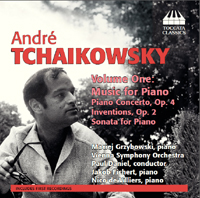
CD
Cover features a
photograph of André
Tchaikowsky from c. 1966
(André Tchaikowsky Estate)
|
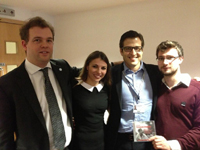
Performers
and contributors (left to right) Jakob Fichert, Anastasia Belina-Johnson,
Nico de Villiers, and Mark Rogers (recording engineer for the
Toccata Classics CD).
|
Links
related to the Toccata Classics CD TOCC0204:
|
The
2013 Bregenz Festival
The centerpiece of the 2013 Bregenz Festival was the world premiere
of André's opera, The Merchant of Venice. Coupled with
the opera performances (there were three), there were "Music and
Poetry" concerts featuring The
Inventions Opus 2, Seven
Sonnets of Shakespeare, String
Quartet No. 2, Arioso
e Fuga per Clarinetto Solo, Trio
Notturno Op. 6, and Tango
and Mazurka (from Six Dances for Piano). Finally, a symphonic concert
featuring the Piano Concerto Opus 4, played brilliantly by Maciej Grzybowski.
Music/MP3
While only one professional recording is available for the Piano Concerto
Opus 4, concert recordings have been made of performances by Radu Lupu
(1975), André Tchaikowsky (1978), Norma Fisher (1986), and Maciej
Grzybowski (2008) (2013), which are listed below as *.mp3 files. Since
the concerto is played without pause between movements, the complete
*.mp3 may offer the best presentation.
Royal Philharmonic
Orchestra
London, England
28 October 1975
Radu Lupu - Piano
Uri Segal - Conducting
00_r_lupu_opus_4_complete.mp3
01_r_lupu_opus_4_introduction_1st_mvmt.mp3
02_r_lupu_opus_4_passacaglia_1st_mvmt.mp3
03_r_lupu_opus_4_capriccio_2nd_mvmt.mp3
04_r_lupu_opus_4_finale_3rd_mvmt.mp3
Irish National
Orchestra
Dublin, Ireland
1 October 1978
André Tchaikowsky - Piano
Albert Rosen - Conducting
00_a_czajkowski_opus_4_complete.mp3
01_a_czajkowski_opus_4_introduction_1st_mvmt.mp3
02_a_czajkowski_opus_4_passacaglia_1st_mvmt.mp3
03_a_czajkowski_opus_4_capriccio_2nd_mvmt.mp3
04_a_czajkowski_opus_4_finale_3rd_mvmt.mp3
Tivoli
Summer Orchestra
Copenhagen, Denmark
12 September 1986
Norma Fisher - Piano
Uri Segal - Conducting
00_n_fisher_opus_4_complete.mp3
01_n_fisher_opus_4_introduction_1st_mvmt.mp3
02_n_fisher_opus_4_passacaglia_1st_mvmt.mp3
03_n_fisher_opus_4_capriccio_2nd_mvmt.mp3
04_n_fisher_opus_4_finale_3rd_mvmt.mp3
|
|
This
performance is on YouTube. Click
Here (opens new window) |
Sinfonia Varsovia
Warsaw, Poland
17 August 2008
Maciej Grzybowski – Piano
Jacek Kaspszyk - Conducting
00_m_grzybowski_opus_4_complete.mp3
01_m_grzybowski_opus_4_introduction_1st_mvmt.mp3
02_m_grzybowski_opus_4_passacaglia_1st_mvmt.mp3
03_m_grzybowski_opus_4_capriccio_2nd_mvmt.mp3
04_m_grzybowski_opus_4_finale_3rd_mvmt.mp3
Vienna
Symphony Orchestra
Bregenz, Austria
22 July 2013
Maciej Grzybowski – Piano
Paul Daniel - Conducting
00_m_grzybowski_opus_4_complete2.mp3
01_m_grzybowski_opus_4_introduction_1st_mvmt2.mp3
02_m_grzybowski_opus_4_passacaglia_1st_mvmt2.mp3
03_m_grzybowski_opus_4_capriccio_2nd_mvmt2.mp3
04_m_grzybowski_opus_4_finale_3rd_mvmt2.mp3
Lublin
Philharmonic Orchestra
Lublin, Poland
29 September, 2017
Maciej Grzybowski – Piano
Piotr Wajrak - Conducting
lublin_opus_4_complete.mp3
lublin_opus_4_introduction_1st_mvmt.mp3
lublin_opus_4_passacaglia_1st_mvmt.mp3
lublin_opus_4_capriccio_2nd_mvmt.mp3
lublin_opus_4_finale_3rd_mvmt.mp3
|
|
This
performance is on YouTube. Click
Here (opens new window) |
Performances
The following is a list of the performances of the Piano Concerto -
Opus 4:
1.
Royal Philharmonic Orchestra
London, England
28 October 1975
Radu Lupu - Piano
Uri Segal - Conducting
2.
Irish National Orchestra
Dublin, Ireland
1 October 1978
André Tchaikowsky - Piano
Albert Rosen - Conducting
3.
Irish National Orchestra
Cork, Ireland
2 October 1978
André Tchaikowsky - Piano
Albert Rosen - Conducting
4.
Hagen Symphony Orchestra
Hagen, Germany
17 November 1981
André Tchaikowsky - Piano
Yoram David - Conducting
5.
Tivoli Summer Orchestra
Copenhagen, Denmark
12 September 1986
Norma Fisher - Piano
Uri Segal - Conducting
6.
Orkiestra Symfoniczna Filharmonii Kaliskiej
Kalisz, Poland
8 February 2008
Maciej Grzybowski – Piano
Adam Klocek – Conducting
7.
Podlasie Opera and Philharmonic
Bialystok, Poland
15 February 2008
Maciej Grzybowski – Piano
Nikolai Dyadiura - Conducting
8.
Sinfonia Varsovia
Warsaw, Poland
17 August 2008
Maciej Grzybowski – Piano
Jacek Kaspszyk - Conducting
9.
Vienna Symphony Orchestra
Bregenz, Austria
22 July 2013
Maciej Grzybowski – Piano
Paul Daniel - Conducting
10. Lublin
Philharmonic Orchestra
Lublin, Poland
29 September 2017
Maciej Grzybowski – Piano
Piotr Wajrak -Conductor
Music
Publisher
This
work is
published by Josef
Weinberger and appears in their catalog of André Tchaikowsky
published works. Click Here
for a PDF copy of the André Tchaikowsky Weinberger catalog.

From
the biography The
Other Tchaikowsky
On August
24, 1971, André was scheduled to play the Goldberg Variations
at Albert Hall Promenade concert. The music critic for the Arts Guardian,
Gerald Larner, asked André for an interview. André thought
Larner one of the better music critics and granted the interview. On
the day of the concert, the interview was published:
Tchaikowsky
Mark Two
I came
across André Tchaikowsky in the street, humming to himself,
his head bobbing in time not with his feet but with the imagined music,
his fingers drumming on the imagined keyboard. So I asked him what
he was playing. "Oh, I'm writing a piano concerto. One movement
is not finished yet." When it is ready he will play it, of course,
but he would rather not give the first performance: "I would
get so nervous."
He gets
very nervous, anyway, about playing in public. "Sometimes I wish
I could drop dead before a concert." But he would never give
it up. If composition is, as he said, "what makes me tick,"
playing the piano is what makes him tock. Even if he could earn a
living as a full-time composer, he would still play the piano: "I
couldn't live without it." Not that he does make money out of
writing music. "I have not made a penny out of it, and I don't
think I ever will."
"Who
plays it?" I asked. "Practically nobody", he said.
But Gervase de Peyer has played his Clarinet Sonata (published by
Weinberger), the Lindsay Quartet will perform his String Quartet,
and Margaret Cable has sung his cycle of Seven Shakespeare Sonnets.
He has also written a violin concerto and Novello is about to publish
some piano pieces called The Inventions.
Most
young soloists could not find time for composition even if they had
the inclination. "Writing is a pretty obsessive occupation. I
don't do it when I am on tour. It is too demanding." So, in order
to tick, he takes a few months off every year, usually June and July.
A couple of years ago it was three winter months in the mid-season,
which is professionally unheard of. In order to make sure that he
is tocking properly, he also takes time off to visit "an old
lady in the Lake District" who apparently has a "fantastic
ear." She listens to his playing and, without concerning herself
with interpretation, picks holes in his technique. "She treats
me as if I were six. She's very bad for my self-confidence."
Obviously,
André Tchaikowsky is no ordinary career pianist. His reputation
of being "difficult" still lingers on. This has only partly
to do with his musical principles - that he won't play works he is
not "crazy about," like Grieg, Tchaikovsky, and Rachmaninoff
concertos, which are "corny." He has doubts even about the
"Emperor" and Bartok's Third, though Bartok has been one
of the major influences on his own music. Bartok's Second is "just
too difficult. My arms would drop off." But he plays the Schumann
and Beethoven's Third and Fourth, which are his favourites outside
of Mozart. "Mozart comes first every time. Most people would
agree that humanity and perfection are mutually exclusive, but the
exception is Mozart."
Nor is
his reputation for being difficult due to the occasional awkward encounter
with conductors. "I don't get on with grand old people,"
he admits, and prefers to work with young ones. "Old conductors
are much bossier and less flexible," particularly some senior
German ones who apparently like to maintain a military discipline
and expect him to salute and "Jawohl" rather than discuss
the interpretation. His fingers drummed on the keyboard again, and
the baldish head bobbed in time.
Eventually,
before he came to settle in this country, "everyone was sick
to the teeth with me. They thought I played the piano rather well
but they found me insufferable.” But he finds that it is only
a "false situation" which brings out the worst in him. Even
in England, which he regards as a "supremely civilised country
-- the first in which a central-European refugee like me could feel
really safe," he had a difficult time at first. He had so little
work between 1960 and 1962 (having got on the wrong side of his manager)
that he had to borrow money from his teacher, Stefan Askenase.
Now,
however, he seems quite happy. Certainly, I found him very polite
and unusually modest, with a cheerful sense of humour. The more he
feels at home, the better the sense of humour works. New Zealand,
for example, he regards as "Arcadia, so innocent, so unspoilt,
no snobs, no rat race." And it was in New Zealand, on a recent
tour with Christopher Seaman, that, for an encore, Tchaikowsky conducted
the orchestra and Seaman played the piano. The orchestra was as surprised
as the audience: "For heaven's sake", André told
the orchestra, "don't pay any attention to me."
Another
place where he is happy, and popular as a teacher, is the summer school
at Dartington. "Where else can you play to an audience two-thirds
of which you are sexually attracted to?" I said I didn't know.
He said that once when he could not be at Dartington he sent a postcard
saying simply, "I love you. Will you marry me?" They pinned
it to the notice board. He was there again this summer.
Most of
June, July, September, October, and December of 1971 was kept free of
concerts. André was bearing down on completing a composition
started in 1966.
After many
starts and stops, writings and rewritings, the Piano Concerto (1966-1971)
was completed in December 1971. There were occasional references to
the concerto in correspondence during the years, but things really didn't
start to sound conclusive until 1970. In a letter to Halina Wahlmann-Janowska
on November 4, 1970, André wrote:
Dear
Halinka,
The famous
piano concerto is not ready yet. I should call it, "The Eternal
Song," but I think it's turning out quite well. So far, four
people have seen it: Stefan Askenase, Stephen Bishop [Kovacevich],
Hans Keller, and George Lyward (the psychologist that I've told you
so much about). Everyone was very impressed. I was most happy with
Lyward's reactions because he's not a professional musician and he
reacts instinctively. It appears that my music can influence someone
who doesn't go into the particulars of musicological analysis, that
normal human sensitivity is quite enough.
Yours,
André
On occasion,
André would visit the Harrison/Parrott office in London. One
reason for his visits was to use their photocopy machine to make copies
of his compositions. On one visit in 1970, with a great pile of papers
tucked under his arm, André ran into another Harrison/Parrott
artist, pianist Radu Lupu. Lupu, a man of few words, remembers his brief
conversation with André:
Lupu:
What are these papers?
André: My piano concerto.
Lupu: Oh, I will play it.
André: You do not know it.
Lupu: Tell me then.
André: It has a slow introduction...
Lupu: I adore slow introductions.
André
couldn't believe his good fortune. He admired Lupu's piano playing and
his willingness to play the concerto would practically guarantee a performance.
However, it wasn't quite that easy. After more than a year of trying,
Terry Harrison found no orchestra interested in this new work, partly
because it was very difficult and would require extra rehearsals. In
July 1973, Terry Harrison wrote to Hans Keller at the BBC asking if
they might arrange a first performance. Hans sent Terry to the planner
at Royal Festival Hall, and, by November 1974, a date had been set.
The concerto would be played in the Royal Festival Hall by the Royal
Philharmonic, conducted by Uri Segal, and the pianist, of course, would
be Radu Lupu. The date was October 28, 1975.
What Radu
Lupu didn't know was that the concerto was terribly difficult and would
take him nearly six months to learn. Radu Lupu:
"André
came to my house about two weeks before the performance. He practically
moved in with me and we played day in and day out. It was wonderful
help. He was the orchestra on one piano, and I was soloist on the
other piano. André was so patient with me, so incredibly patient
and nice to me. The concerto was his child, and he was like a father
to the child. I'm not sorry now, but it was a lot of work and I swore
more than a few times. Uri came by to listen and to 'conduct.' André
and Uri knew each other and were already good acquaintances, but it
took a while for them to warm up to each other. I was very nervous
before the performance. I was green with nervousness. The concerto
is very difficult, so hard to play. I used the music at the concert,
but I had it memorized and only looked at it maybe a few times. I
never argued with André. I knew there were some people you
didn't want to be on the wrong side of, and André was one of
them."
To Halina
Wahlmann-Janowska, André wrote on October 14, 1975, less than
two weeks before the premiere performance:
My darling,
crazy, and luckily incurable genius,
On the
28th of October the first performance of my piano concerto is taking
place in London. Radu Lupu is playing and Uri Segal is conducting
the Royal Philharmonic Orchestra. The trouble is that they only have
time for one rehearsal, the day before the concert, and the music
is incredibly complex. On the day of the concert, they're going to
have a run-through and that's it. To make things easier for Uri, I've
spent about 100 hours correcting orchestral parts, which were full
of mistakes. But the concerto is so difficult that it may simply turn
out to be unplayable. What am I going to do if the day before the
concert the orchestra announces that it simply cannot be played? Everybody
is nervous: Radu, who plays the piano part brilliantly, Uri, the orchestra,
my agent, my publisher of the music score, and me.
Yours,
André
The concerto
was dedicated to George A. Lyward in the original manuscript, but to
pianist Radu Lupu in the published version. The change of dedication
may have something to so with the enormous amount of work required of
Radu to learn the concerto.
The concert
itself was a spectacular event in the world of pianism. Here was one
of their own, who had written a concerto, and it was to receive a first
performance by someone they regarded as one of the world's leading pianists.
Virtually every pianist in Europe who could make the concert was there.
Someone said that if Royal Festival Hall had collapsed that night, half
of the world's greatest pianists would have perished.
All the
London newspapers reviewed the concert. The reviewers were unaware of
André's earlier piano concerto (1956-1957), hence, they called
this his concerto No.1, or his first concerto. Joan Chissell of The
Times reported:
RPO
/ Segal
In the
nineteenth century, and even the early twentieth, too, there would
have been nothing unusual about going to hear a new piano concerto
composed by a well-known concert pianist. In fact, it would have been
far more strange to encounter a performer of note not given to spare-time
composing. In our highly specialised world of today, things are different.
So last night's premiere of the piano concerto No.1, written by the
eminent Polish-born pianist André Tchaikowsky, was an event.
Perhaps because he was anxious to stress the growing ascendancy of
the composer in himself over the pianist, Mr. Tchaikowsky did not
play it. The soloist with the RPO under Uri Segal was Radu Lupu.
The work
is in three continuous, interlinked movements lasting for about 27
minutes. No one but a virtuoso of the first order could tackle the
solo part. Yet not a note is there for mere display. Piano and orchestra
are as closely integrated in a disciplined, purposeful argument as
in the concertos of Brahms. Although, in his introductory note, the
composer let us into formal secrets (a passacaglia to begin with,
followed by a scherzo-like Capriccio and a Finale combining fugue
and sonata), there was little about underlying 'programme.' Yet the
work is dramatic and intense enough, in an often strangely ominous,
disquieting way, to suggest very strong extra-musical motivation.
There are moments of melancholy just as deep and tortured as in Berg
opus 1 [piano sonata]. Not for nothing is the glinting central Capriccio
headed "vivace con malizia": it is a 'danse macabre' ending
in catastrophic climax. Even the Finale, at first suggesting emotional
order won by mental discipline, eventually explodes in vehemence before
the sad, retrospective cadenza (picking up threads from the opening
Passacaglia) and the hammered homecoming.
If nearer
in spirit to composers of the Berg-Bartok era than the avant-garde,
Tchaikowsky still speaks urgently enough in this work to make his
idiom sound personal. Much of it is also strikingly conceived as sound,
with telling contrasts of splintered glass and glassy calm in the
keyboard part. The Capriccio is a spine-chilling tour de force for
the orchestra too. In view of fantastic difficulties, the performance
held together remarkably well, with Radu Lupu surpassing himself in
virtuosity and commitment.
Joan Chissell's
review (above) was highly influenced by Judy Arnold, André's
former Personal Representative. Judy remembers:
As far
as Joan Chissell's review in The Times is concerned, I have
to have a laugh. Joan was a close friend. She utterly hated having
to give in her copy immediately following a performance. She was much
happier as a writer having her own time and space in which to develop
her ideas. She was utterly not acquainted with any modern music, and
didn't at all like the idea that she had been given the assignment
of a new piece of music to review, and she phoned me up and asked
me what she should say about the concerto before attending the performance.
I, of course, didn't know anything about it, as I hadn't heard it,
but I knew André's style of writing, which, at the time (and
still) seemed most decidedly not-modern (if I can put it like that).
There is of course nothing wrong in that. Thus, Joan's views on the
concerto have got quite a lot of me in them.
Max Loppert
wrote for the Financial Times:
André
Tchaikowsky's Concerto
The long
and glorious tradition of piano concertos written by renowned virtuosi
was continued last night -- honourably, if not remarkably -- in the
first performance of André Tchaikowsky's first essay in the
form. Mr. Tchaikowsky, who might have been expected to produce for
his own use one of those whizz-bang thunderers guaranteed to win a
certain kind of immediate success, has instead composed for Radu Lupu
a concerto that honestly attempts to set out a disciplined and rigorously
conceived musical argument, in which all extraneous piano fireworks
have been sternly abjured.
It was,
from the outset, rather impressive to encounter music of this kind
concerned with "strict construction" (the composer's phrase),
made with clean-cut neo-classical materials purposeful and determined
(the possibly unhelpful contrast with the bombast of David Morgan's
new piece on Sunday was encouraged by the presence of the same orchestra,
the Royal Philharmonic). At best, in the central Capriccio movement,
something of an individual personality, quicksilver, angular and hard-edged,
can be detected through the Stravinskyian cut-and-thrust, the late-Prokofiev
flourishes and moto perpetuo passagework.
Elsewhere,
in the Introduction and Passacaglia, but more so in the Finale, brandishing
its fugue, sonata, and toccata, a slight greyness threatens to seep
out from the basic material, a want of burning organic energy to be
revealed behind the formal gestures. It will be interesting to hear
the work again, with an orchestra and conductor more firmly in possession
of the shifting rhythmic patterning than were the RPO and Uri Segal.
An important novelty that cannot be undervalued in the concerto is
the provision of a new performance personality for Radu Lupu, one
much spikier and less self-possessed than he has so far disclosed
in London, and rewarding to meet. On this form, forward-thrusting
as well as dreamy-toned, a whole range of greater 20th-century piano
concertos awaits his attention.
Edward
Greenfield wrote for the Arts Guardian:
RPO
/ Segal
There
were some, I imagine, who came to this Festival Hall concert puzzled
that the Royal Philharmonic Orchestra were offering the world premiere
of Tchaikovsky's First Piano Concerto. It was of course quite different
music from the celebrated B-flat minor of Peter Ilych, for the pianist
André Tchaikovsky is also a composer and has delivered himself
of a piano concerto. For this first performance he had the rare restraint
to sit in the audience and get a distinguished colleague, Radu Lupu,
to play the solo part instead of himself.
"I
made a determined effort not to write a 'prima donna's favourite,'"
Mr. Tchaikovsky explained in his programme note, and, for the first
five minutes, that seemed the understatement of the year. Like the
B-flat minor concerto, the new Tchaikovsky first starts with an introduction,
but in the composer's own words, 'it is slow and austere,' and the
piano for three whole minutes never gets a look-in, while the thematic
material for the whole work is grittily outlined. After that, flamboyance
still rejected utterly, the pianist enters with a long and ruminative
solo, which sets the pattern of wrong-note romanticism in gently flowing
lines.
As a
virtuoso, Mr. Tchaikovsky is an unashamedly flamboyant musician, but,
whether to compensate or in genuine revelation of his inner self,
much of this work takes quite the opposite course. Even when the first
movement Passacaglia really gets going, there is little display. But
then, with the Capriccio second movement (Goya's grotesque Capriccios
implied as an inspiration), and even more in the sonata-fugue Finale,
the composer begins to enjoy himself. The energetic last movement
may be the most obviously derivative of the three, but it is also
the most memorable.
Radu
Lupu, dedicatee as well as soloist, was the most persuasive of advocates,
but the orchestral accompaniment (including much solo string work
but with only 16 violins generally working in unison and no second
violin section) was difficult enough to present the RPO and Uri Segal
as conductor with serious problems. At least such passages as the
desolate end of the Passacaglia and the toccata-like coda of the Finale
suggested that with more time for preparation, the whole structure
would hang together better.
The piano
concerto was one of the few exceptions to André's rule of not
playing his own compositions in public. André never played his
"The Inventions" in public, or his clarinet sonata, but his
concerto was different. If Radu Lupu had been indisposed on the October
28, 1975, for the piano concerto, André had already memorized
the work and could have stepped in at the last minute.
Terry Harrison
had hopes for future performances of the piano concerto after the world
premiere. In a December 1975 letter, Terry wrote to André's German
manager:
Dear
Hans Ulrich,
Recently
the world premiere of his first orchestral work took place. This was
a piano concerto, played by Radu Lupu. Incidentally, the success was
very big and there are going to be two repeat performances, including
a London performance in the 1977 Proms. There is also interest abroad
-- I think it may be done in Stuttgart -- Previn is interested in
doing it with Radu in Pittsburg, and Foster is interested in doing
it in Houston.
In a January
1976 letter, Terry tried to interest Christopher Seaman and his Glasgow
Orchestra, but Christopher had to refuse due to inability to give the
concerto proper rehearsal time. Terry wrote letters literally for years
to BBC facilities, orchestras, and conductors, trying to find a second
performance. By 1977, Radu withdrew his selection as a soloist as the
concerto had now slipped from his fingers. Radu, and others, so thought
it a shame that a second performance was not forthcoming. Terry continued
his efforts, this time promoting André as the soloist.
Finally,
the Irish National Orchestra, conducted by Albert Rosen scheduled two
performances, one in Dublin, on October 1, 1978, and the second in Cork,
on October 2,1978. The recordings from these performances are only a
few of the official recordings ever made of the concerto. The performance
was reviewed by Robert Johnson of the Irish Press:
André
Tchaikowsky was soloist in his own piano concerto (first performed
in 1975). It is in three movements and very modem in style if a trifle
episodic, and the inner movement is full of delicate and exciting
ideas, particularly the percussion effects. Like many modern works
it needs to be heard again, exciting as it was.
Terry continued
to push for additional performances. Copenhagen had agreed to schedule
the work, and finally, the BBC agreed to make a recording for a radio
broadcast. The orchestra in Hagen, Germany scheduled the concerto for
November 17, 1981, and again André was the soloist, with conductor
Yoram David. The critical review in the Westfalenpost:
First
Performance at City Hall
A very
memorable event occurred last night in Hagen with a concerto performance
at the City Hall. The conductor, Yoram David, presented a 1971 composition
for piano and orchestra written by André Tchaikowsky, with
the composer personally at the piano. This was the first German performance.
The concerto
is dedicated to the famous pianist, Radu Lupu, who played the world
premiere in 1975 at the London Royal Festival Hall. The concerto was
presented again in Ireland, in 1978. Yoram David was excellent and
the concerto is surely the best since Brahms.
A critical
review in the Westfalische Rundschau (No. 270) reported:
German
First Performance - Tchaikowsky
The fourth
Hagen symphony concert introduced, as a German first performance,
the André Tchaikowsky piano concerto. The first performance
was given at the Royal Festival Hall in London in 1975. It is a masterpiece
of composition.
André
Tchaikowsky (age 46), especially appreciated as a Mozart virtuoso
all over the world, played the piano part at the Hagen City Hall concert
himself. Is the concerto calculated such that the piano part is dominant?
André Tchaikowsky: "This is what I've tried to avoid.
The instruments are introduced in groups and separately. The work
is so polyphonic as to make great demands on every member of the orchestra."
André
Tchaikowsky, who appeared very successfully as a soloist with the
Hagen Symphony orchestra in 1964, played his unique concerto only
twice before, both times in Ireland. Yoram David, the conductor of
this event, says: "This concerto for piano and orchestra is a
phenomenally good work, tremendously crafted and is without a superfluous
note."
Another
reviewer in the Westfalische Rundschau (No. 271) wrote:
Tchaikowsky
Concerto Well Received
The audience
at the fourth symphony concert heard the German premiere of the concerto
for piano and orchestra by André Tchaikowsky, which was received
with great applause. World experts of the piano raved about the first
performance of this famous composition at the world premiere at the
Royal Festival Hall in 1975.
Yoram
David and the orchestra rehearsed the concerto in a short time. It
is in three movements of various themes which were worked in a logical
and consequential manner. After the performance, Yoram David and André
Tchaikowsky offered an opportunity to discuss the work at an interview
session. [André's fluent German amazed Yoram David.]
The Hagen
orchestra gave the concert an excellent interpretation, including
many instruments not usually heard. The theme was worked out intelligently
and well considered, as Yoram David obviously enjoys the composition,
giving it precise tempi and excellent sound levels.
The concerto
was scheduled to be recorded by the BBC Northern Symphony Orchestra
conducted by Albert Rosen, with André as soloist, on March 2
and 3, 1982. Unfortunately, André was ill at the time, and the
session had to be canceled. The Copenhagen performance promised by André's
good friend Lars Grunth took place but not with André as soloist.
The soloist was British pianist Norma Fisher. Norma had also given the
first complete public performance of André's "The Inventions."
The Copenhagen performance was on September 12, 1986, with the Tivoli
Summer Orchestra, conducted by Uri Segal. Music critic, Jan Jacoby,
wrote of the Copenhagen performance in the Politiken:
Norma
Fisher with Tivoli Symphony Orchestra under Uri Segal
If it
was the horror of having Bruckner's last symphony spoiled by a modernistic
thriller before the intermission that made people come too sparsely
to Tivoli's last, symphony concert this season, then it was due to
a misunderstanding. For André Tchaikowsky's Piano Concerto
is only modern from a chronological point of view.
Most
noticeable was the stylistic reference, which has very little to do
with the 1970s. Tchaikowsky had his ears well tuned to Central Europe
around the first World War, a place between Mahler and Berg, with
the rhythmic twentieth century modernism in view. Norma Fisher gave
a technically impressive and strongly committed performance.
Critic
Hans Voigt wrote of the Copenhagen performance in the Berlingske
Tidende:
Individual
Against Society
"Writing
music is just another way of telling a story," pianist André
Tchaikowsky, the pianist and composer, once said during a visit to
Norway. He also revealed that it was Peggy Ashcroft's acting in Ibsen's
"Rosmersholm" that had given him the inspiration for his
piano concerto. Ibsen's description of an uncompromising hero, an
individual against society, could also be seen as the lone piano against
the enormous forces of the violent and complex orchestra.
But what
comes through even without this background knowledge is an impressive
work with much artistic and constructive strength. The concerto is
a virtuoso work, without being overwhelmingly so, the whole musical
development being taken from the opening slow orchestral introduction
and culminating in the exceptional final closing theme.
The excellent
Norma Fisher played the concerto with remarkable skill, where soloistic
bravura, radiance, gentle strength and the authority of personality
were united effectively.
The two
Polish performances in February, 2008, featuring Maciej Grzybowski at
the piano were very exciting and each concert hall in Kalisz and Bialystok
were full to the last seat. Maciej rose to the difficult task at hand.
In a previous 2006 concert featuring the music of Andrzej Czajkowski,
the Warsaw Voice had this to say about Maciej:
Czajkowski
Rediscovered
Olsztyn
and Kielce will soon host two interesting concerts dedicated to the
music of Andrzej Czajkowski. Last November marked the 70th birthday
of the late outstanding pianist, whose achievement as a composer remains
virtually unknown.
Maciej
Grzybowski, one of the most interesting Polish pianists around, has
decided to change this state of affairs. Fascinated with Czajkowski's
music, he tries to feature Czajkowski's works into his own performances.
According to Grzybowski, Czajkowski is "the greatest Polish composer
after Chopin, Szymanowski and Lutoslawski, and next to Penderecki
and Szymanski." "Here is an artist of phenomenal technique,
extraordinary imagination, an amazing sense of musical drama, no less
than brilliant intuition unmistakably leading him towards the 'yet
undiscovered,' an extremely rare sensitivity to sound-its color and
context-and harmonics; a master of declamation and structure showing
a 'flair for the dramatic,'" says Grzybowski.
At the
Olsztyn Philharmonic March 24 and the Swietokrzyska Philharmonic in
Kielce April 3, Grzybowski will present a program of Czajkowski's
works, accompanied by excellent musicians: Urszula Kryger-vocal, Krzysztof
Zbijowski-clarinet, Marcin Suszycki-violin, and Karol Marianowski-cello.
The program includes Sonata for Clarinet and Piano (1959), Inventions
for Piano (1961/62) and Seven Sonnets by Shakespeare for Voice and
Piano (1967).
Czajkowski
was born Nov. 1, 1935 in Warsaw. He studied in Poland, France and
Belgium. In 1955, he garnered acclaim as the youngest laureate of
the Frederic Chopin Competition. In 1956, he received the Third Prize
at the Queen Elizabeth Competition in Brussels. In the same year,
he left Poland to settle in England. He was a very successful pianist,
giving 500 recitals and concerts over three years, as well as making
many recordings. Later he devoted himself to composition. He died
in 1982 in Oxford.
A review
of Maciej Grzybowski's concerto performance in Kalisz on 8 February
2008 was published by the Polska Agencja Prasowa (PAP). (Click
here for the Polish version as a PDF file.)
First
Time in Poland
Piano
Concerto by Andrzej Czajkowski
Kalisz
(PAP) - Pianist Maciej Grzybowski was rewarded with a standing ovation
after his performance Friday evening in Kalisz of the piano concerto
of Andrzej Czajkowski (1935-1982).
This
music by Andrzej Czajkowski was performed for the first time in Poland
and for only the sixth time in the world. The Kalisz Philharmonic
Orchestra was conducted by the Director Adam Klocek. In the first
portion of the concert, music lovers heard Sergei Prokofiev’s
Symphony No 1 in D major "Classical Symphony," Op 25, which
was followed by a dance from Prince Igor, an opera by Aleksandr
Borodin.
Friday's
concert was one of the biggest events of the current artistic season
in Kalisz. There was not one empty seat in the concert hall, located
in the John Paul II Plaza. After the concerto performance, the audience
was hoping for more but Director Klocek explained that due to the
demands that the concerto placed on the pianist, that Grzybowski would
be unable to honor the request for an encore. According to the Director,
the concerto was the most difficult piece the orchestra has ever performed.
The occupants in the box seats were stating that the concerto fine
performance would undoubtedly go down in history.
They
also underlined that Czajkowski’s music was a reflection of his
difficult life. As a Jewish child during the second world war he was
hidden in a closet. Later on he wanted to catch up with his lost years
and - often by playing and later by composing. "His music reflects
all of his life," - people were saying.
Czajkowski’s
Piano Concerto was first performed by Radu Lupu and Uri Segal at the
Royal Festival Hall in London in 1975, and was declared by critics
at that time as the best piano concerto since the time of Bartok.
A special guest at the Kalisz concert was music lover, biographer
of Andrzej Czajkowski, and author of the Internet page about him -
American David Ferre.
According
to Adam Klocek, the concerto concert was a true Polish event. Czajkowski
was a pianist playing in the largest concert halls of the world. He
also recorded many records for well known recording companies. The
director mentioned that while he was somewhat forgotten in Poland
he still has many fans.
Czajkowski
was born in Warsaw. From 1945 through 1948 he was taking piano lessons
in Lodz under the instruction of Emma Altberg. Later he studied in
Paris under Lazare-Levy, and next in Sopot and then Warsaw. In 1955
he received eighth place and was the youngest pianist in the Fifth
International Piano Contest held in the name of Fryderyk Chopin. He
also received special acknowledgment from Arthur Rubinstein.
After
his success at the Chopin competition, Czajkowski traveled to Brussels.
Later he performed in Europe, the United States and New Zealand with
the finest orchestras of the world under conductors like André
Cluytens, Karl Bohm, Carl Maria Giulini, and Carlo Zecchi. During
the 1950s and 1960s Czajkowski performed 500 piano recitals with tremendous
success. In 1960 he settled in London. He died in Oxford.
On August
17, 2008, the Piano Concerto was performed again by Maciej Grzybowski
as part of the Chopin
and his Europe Festival in Warsaw, Poland. [Click
Here for a review of an October, 2009 recital by Maciej Grzybowski,
at the Polish Embassy in Washington, D.C. USA.] The following review
for the Polityka newspaper by Dorota Szwarcman appears on her
website.
Andrzej
Czajkowski
Briefly,
from the flames of an outstanding event on Sunday evening at the Chopin
and his Europe Festival...
This
is about the Piano Concerto No. 2 by the composer Andrzej Czajkowski,
who lived in Great Britain for many years as André Tchaikowsky.
The concerto was performed by pianist Maciej Grzybowski who tirelessly
promotes the music of Andrzej Czajkowski, and with the Sinfonia Varsovia
under the baton of Jacek Kaspszyk, who some years ago met Andrzej
Czajkowski in London.
Although
André Tchaikowsky was the hero of the "Hamlet" story
from the book by Hanna Krall, Proof of Existence, this is about
music, about composition. Tchaikowsky was a fantastic and well-known
pianist, but apparently preferred the life of an unknown composer.
In general, composing as a career is not easy, but it is even more
so for Tchaikowsky because his compositions are difficult and require
total commitment from the musicians.
Maciej
Grzybowski is very involved in restoring, and properly placing on
a concert stage, the compositions of André Tchaikowsky. To
this extent, Grzybowski performs Tchaikowsky's music all over the
country and plays songs [Seven Sonnets of Shakespeare], piano pieces
[The Inventions], and chamber works [Trio Notturno, Sonata for Clarinet
and Piano] as well as the Piano Concerto No. 2. I was at a concert
once in Olszytn that was dedicated entirely to compositions by André
Tchaikowsky.
For this
concert, Grzybowski wrote his own program notes and I asked him if
the music is physiological? For me, this is music after the world
war catastrophe, which connects it to works by composers from the
Terezina Concentration Camp, for example, with Gideon Klein and Viktor
Ullmann. Maciej agreed that to a certain extent that - yes - this
is holocaust music. Well, this is subjective. The objective is excellent
musicianship by performer and composer, and it just chokes me up.
For me, it's the piano concerto.
The Piano
Concerto (1966-1971) Opus 4, was published by Josef Weinberger, Ltd.
in 1975; a two-piano reduction by the composer was also published.
|














































